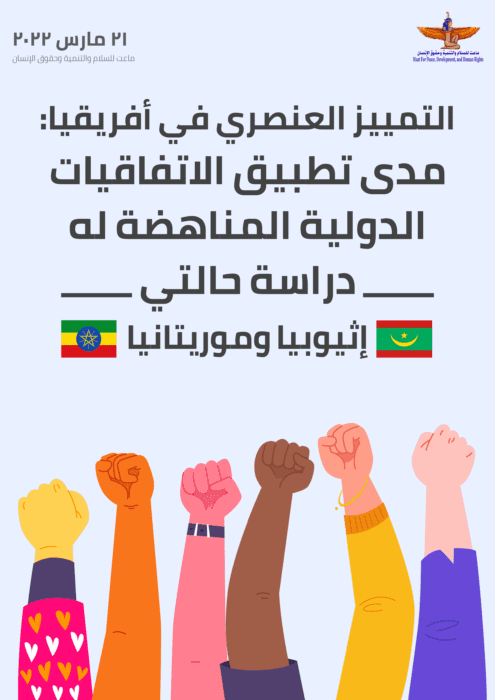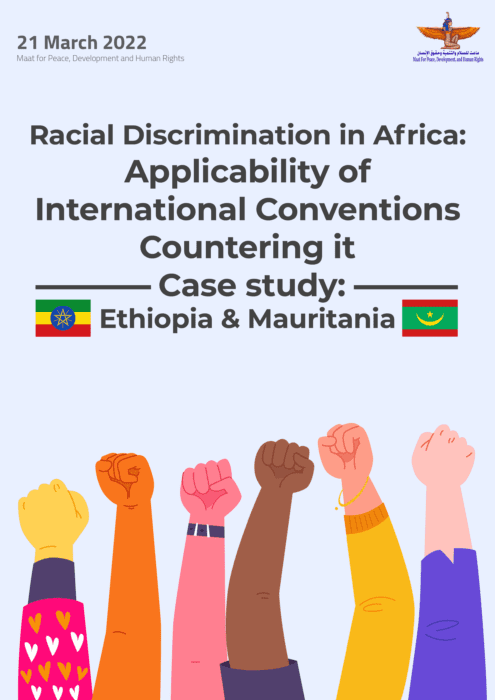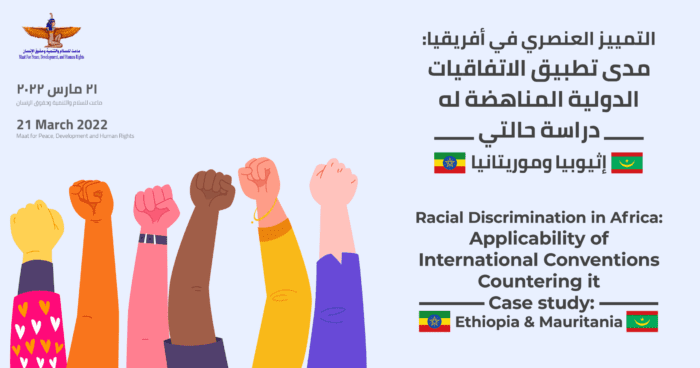On the International Day for the Elimination of Racial Discrimination, Maat: Discriminatory Practices in Africa still Continue
Okeil: We call on the Ethiopian government to stop the systematic policies of racial discrimination against the Tigrayan people
Jabr: The Mauritanian government should launch a long-term awareness campaign to put an end to slavery
On the sidelines of Maat for Peace, Development and Human Rights participation in the 49th session of the Human Rights Council, and along with the launch of discussions and interactions within the Council on the eighth and ninth items concerned with racial discrimination, and in conjunction with the International Day for the Elimination of Racial Discrimination, Maat issued a study entitled “Racial Discrimination in Africa: Applicability of International Conventions Countering it, with Ethiopia and Mauritania as case Studies", with the aim of highlighting the persist patterns of racial discrimination and the accompanying negative practices such as slavery and modern slavery in both Ethiopia and Mauritania.
The study showed that during the Tigrayan war that was sparked in November 2020, ethnic profiling against the Tigrayans continued. In addition, Ethnic Tigrayan members of Ethiopian components of United Nations peacekeeping missions were disarmed, and at Ethiopia's U.N. mission in New York, Tigrayan peacekeepers were disarmed due to ethnicity. Among waves of arrests of journalists and human rights defenders, 500 Tigrayans were also detained in a detention center In Addis Ababa.
The study also highlighted the persistence of slavery in Mauritania. Despite the state’s accession to many anti-slavery international conventions, such as the Geneva Convention in 1953 and the UN Convention for the Suppression of the Traffic in Persons and of the Exploitation of the Prostitution of Others (1949), it has the highest proportion of hereditary slavery in the world, with about 20% of the Mauritanian population, which confirms the continuation and prevalence of slavery in Mauritania.
In this context, Ayman Okeil, the international human rights expert and president of Maat, stated that systemic racial discrimination in Ethiopia continues despite the state’s accession to and ratification of the International Committee on the Elimination of Racial Discrimination. Ethiopia’s practices represent a flagrant violation of Article 3 of the Convention. The human rights expert also called on the Ethiopian government to put an end to the systematic military operations against the Tigrayan civilians, quickly and unconditionally release detainees who were arrested during the state of emergency, and to abide by its Constitution, which stands in its Article 39 to grant all peoples of Ethiopia the right to self-determination without any ambiguity.
For her part, Yasmine Gabr, a researcher in the African Affairs and Sustainable Development Unit at Maat, highlighted the importance of the Mauritanian state’s cooperation with non-governmental organizations and religious leaders to launch large-scale and long-term awareness campaigns to put an end to slavery and slavery-like practices. The researcher called on the Mauritanian authorities to conduct an independent and impartial investigation when allegations of discrimination and slavery-like practices are brought to its attention, affirming that the state should guide victims to all remedies available to them, facilitate their access to justice and ensure their right to fair and adequate reparation, in line with its international obligations.

 |
 |











